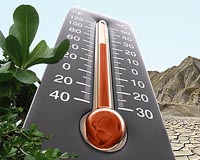 |
London, UK (SPX) Apr 07, 2011 The "colour" of our environment is becoming "bluer", a change that could have important implications for animals' risk of becoming extinct, ecologists have found. In a major study involving thousands of data points and published this week in the British Ecological Society's Journal of Animal Ecology, researchers examined how quickly or slowly animal populations and their environment change over time, something ecologists describe using "spectral colour". Ecologists have investigated the link between fluctuations in the environment and those of animal populations for the past 30 years. They describe fluctuations as a colour spectrum, where red signifies an environment or population that fluctuates more slowly over time (such as ocean temperature) and blue signifies more rapid fluctuations (such as changes in air temperature). Existing models and theories suggest that the spectral colour of the environment should affect the spectral colour of animal populations. Now for the first time ecologists have assembled field data to confirm the theory. Bernardo Garcia-Carreras and Dr Daniel Reuman of Imperial College London examined three large sets of data. They used the Global Population Dynamics Database, from which they extracted data on changes in population for 147 species of bird, mammal, insect, fish and crustacean over the past 30 years, and two sets of temperature data from the Climatic Research Unit and the Global Historical Climatology Network. The latter includes data collected from weather stations worldwide throughout the twentieth century. The study not only confirmed that the colour of changes in the environment map onto the colour of changes in animal populations, but found that our environment is becoming "bluer", in other words fluctuating more rapidly over time. According to Dr Reuman: "We showed using field data for the first time that the colour of changes in the environment maps onto the colour of changes in populations: redder environments mean redder populations, and bluer environments mean bluer populations. We also found that the colour of the environment is changing - becoming bluer - apparently due to climate change." "The colour change refers to the change in 'spectral colour' but this does not mean that red means warmer temperatures. Spectral colour tells us how quickly or slowly temperature is oscillating over time. If the oscillations are comparatively slow, then we say that temperature has a 'red' spectrum, and if the changes are quick, then temperature is said to be 'blue'. When we talk of temperature becoming 'bluer', we mean the oscillations in temperature are becoming faster over time," explains Garcia-Carreras. The results are important because previous studies show that the spectral colour of a population affects its extinction risk. Some simple models tell us that bluer populations - those that fluctuate more rapidly over time - are at less risk of extinction. This is because adverse conditions are more likely to be followed by better conditions when the environment is fluctuating more rapidly. According to Dr Reuman: "Since it was previously known that the colour of changes in populations is related to extinction risk of the populations, our results show a way that climate change should impact the extinction risk of populations by affecting the colour of populations." While the study seems to provide some good news for species facing extinction, the researchers warn that this is offset by other pressures. "This apparent good news is tempered by the fact that habitat loss, overexploitation and other factors are likely more important drivers of extinction risk than the colour of temperature fluctuations," Dr Reuman says.
Share This Article With Planet Earth
Related Links British Ecological Society Climate Science News - Modeling, Mitigation Adaptation
 Climate change called security threat
Climate change called security threatLondon (UPI) Apr 5, 2011 Climate change threatens a global health catastrophe and could undermine global political stability and security, a British Medical Journal editorial says. Medical and military leaders, in a joint editorial, warn that climate change "poses an immediate and grave threat, driving ill-health and increasing the risk of conflict, such that each feeds upon the other," a BMJ release reported W ... read more |
|
| The content herein, unless otherwise known to be public domain, are Copyright 1995-2010 - SpaceDaily. AFP and UPI Wire Stories are copyright Agence France-Presse and United Press International. ESA Portal Reports are copyright European Space Agency. All NASA sourced material is public domain. Additional copyrights may apply in whole or part to other bona fide parties. Advertising does not imply endorsement,agreement or approval of any opinions, statements or information provided by SpaceDaily on any Web page published or hosted by SpaceDaily. Privacy Statement |